
We all know the first line of Pride and Prejudice…
“It is a truth universally acknowledged that a single man in possession of a good fortune must be in want of a wife [wonder woman]….”
Well, that’s the gyst of it anyway, right? Wonder Woman is certainly one of the most iconic characters of all time and has played a significant role in the ethos of cultural ideology since her first appearance in 1941. Just thinking of this DC comic superhero instantly brings to mind many jumbled messages of independence, feminism, sex symbols, women’s suffrage campaigns, AIDS awareness, gay rights, and patriotism. It seems like nearly everyone who is on any side of anything can use Wonder Woman as a champion for their cause. So when I heard that a new movie was coming out about this particular character, I held my breath to see on what ideology the stereotype would land.
Would there be cleavage for days?
Would it be a movie that completely emasculates the male image?
Would she be depicted as being powerfully humble or humbled by power?
Would she be more feminine or more masculine?
Would the theme song be used?
Luckily, my bated breath soon abated as I took the plunge and went to see the movie on opening weekend, and I am happy to report that it was a sigh that was filled with relief!
Not only was Wonder Woman not portrayed as a blazoned, female sex symbol, but she was actually slanted far towards the other direction and graciously clothed in the fabulous chicness of feminine genius.
Before there was that beloved and cherished Diana, Princess of Wales, there was another Diana, more elusive and mysterious, daughter of Hippolyta, Amazon warrior, and Princess of Themysciria. Wonder Woman. That name has always stood out to me because, apart from all that has been misconstrued in the image of this character, it is a universal truth (much like the truth that every man desires a wonder woman) that every woman is indeed a wonder.
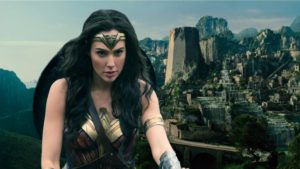
Diana is fierce; like Joan of Arc she has a warrior spirit, grounded in truth, loyalty, and integrity. With her infamous weapon, the Lasso of Truth, she demands honesty from all of those she encounters, and with the weapon of her femininity she commands respect and uses her inherent wiles to generate a a pure and authentic interaction between the sexes.
What is this feminine genius? The term, first coined by St. John Paul II, is described by him as the ability of the woman to “make herself a sincere gift to others.” We see this in Diana who, even from a young age, has a drive for excellence and a sincere passion for service. When the time comes that she must leave her island paradise and engage the world, she arms herself not only with physical weapons, but also with poise and confidence as she embraces her duty and vocation. And even then, like every woman, she has a power of which she cannot even imagine. There is a war happening, and all she knows is that she must do everything she can to stop it. This brings to mind that thrilling passage from the closing remarks of the Second Vatican Council.
“The hour is coming, in fact has come, when the vocation of women is being acknowledged in its fullness, the hour in which women acquire in the world an influence, an effect and a power never hitherto achieved. That is why, at this moment when the human race is undergoing so deep a transformation, women imbued with a spirit of the Gospel can do so much to aid humanity in not falling.” (Pope Paul VI)
Wonder Woman courageously embraces her calling by “doing much to aid humanity in not falling.” It is ingrained in the very heart of a woman that she cannot sit idly by. She must respond to the needs that cry out to her. St. John Paul II states beautifully in his Letter to Women that even the most ordinary woman reveals the gift of her womanhood by “placing herself at the service of others in their everyday lives.”
He continues:
“For in giving themselves to others each day women fulfill their deepest vocation. Perhaps more than men, women acknowledge the person, because they see persons with their hearts. They see them independently of various ideological or political systems. They see others in their greatness and limitations; they try to go out to them and help them.”
Who knew that Wonder Woman’s greatest superpower was not her superhuman strength, speed, durability, reflexes, longevity, skilled hand-to-hand combat, or flying abilities?!  Her worth is not defined by the weapons she is able to wield, though I do look forward to the future illustration of her boomerang tiara (#crownofcreation). No, my friends, Wonder Woman’s greatest superpower is her feminine attention to the hearts of others.
Her worth is not defined by the weapons she is able to wield, though I do look forward to the future illustration of her boomerang tiara (#crownofcreation). No, my friends, Wonder Woman’s greatest superpower is her feminine attention to the hearts of others.
Her greatest superpower is her feminine genius.
Every woman has a unique form of her own individual feminine genius, but in this society, as in every generation, the feminine genius is in the midst of a “war to end all wars.” There is pressure to either surrender feminine genius and live with, as Dietrich von Hildebrand would say, a withered Eigenleben (see more info on this concept in my post on The Horcrux of Singleness) or else there is a push to give our genius an unnatural boost and demand, not an equality of worth, but rather an equality of gender, melting the precious complimentary that contrasts the sexes into a conglomeration of insipid uniformity. Even Diana’s mother cautions her in a touching moment as she prepares to leave her homeland. “Be careful in the world of men, Diana, they do not deserve you.”
What is so refreshing about this movie is that Wonder Woman avoids falling prey to either extreme in the battle for feminine genius. She maintains a firm grasp of her mission, dignity, and utility despite being misunderstood and underrated by the “world of men”. And the best part is, that it is her very femininity that challenges the men to an authentic expression of mas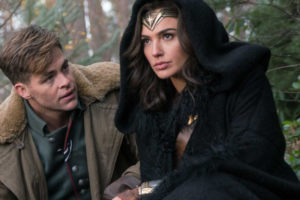 culinity. She dresses modestly except when donning her more “functional” outfit used in her battle scenes. There is even one delightful moment when she is overcome with enchantment at the sight of a baby, as any woman would be. I won’t say that Diana is the quintessential woman (#ourlady), but she is certainly the exact right amount of fierce and tender. And what is ferocity if not simply courageous tenderness in action? She states boldly, “I will fight for those who cannot fight for themselves.” And is this not the mission of all of us, men and women, here on this earth? But it is women more so than men, who, by their very nature, are more capable of noticing and bringing awareness to the pleas of those who cannot fight for themselves.
culinity. She dresses modestly except when donning her more “functional” outfit used in her battle scenes. There is even one delightful moment when she is overcome with enchantment at the sight of a baby, as any woman would be. I won’t say that Diana is the quintessential woman (#ourlady), but she is certainly the exact right amount of fierce and tender. And what is ferocity if not simply courageous tenderness in action? She states boldly, “I will fight for those who cannot fight for themselves.” And is this not the mission of all of us, men and women, here on this earth? But it is women more so than men, who, by their very nature, are more capable of noticing and bringing awareness to the pleas of those who cannot fight for themselves.
Brief pause for a philosophy truth bomb:
“The woman’s soul is fashioned as a shelter in which other souls may unfold.” Edith Stein
I dare you to meditate on that for the rest of your life.
Now, there is a certain camp that might think this authentic femininity would reflect weakness or naivety. Diana does indeed possess a type of pleasant naivety, but it is by no means characterized by an ignorance of knowledge or social witlessness. She is extremely intelligent and especially talented with languages. No, this naivety seems to be rooted in a more blatant ignorance of the lukewarm. She cannot understand 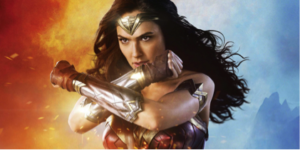 how people are able to shoot the breeze as injustice swirls about them. She is both amused and perplexed that mankind has enslaved themselves to the wristwatch. In fact, aside from an isolated comment in which she insinuates that men are required for procreation but not pleasure, her feminist ideology remains, for the most part, innocent of domination. She believes that everything has a purpose and everyone has a duty, and this manifests as an unyielding shield to both sarcasm and laziness. But she knows what she’s about, make no mistake.
how people are able to shoot the breeze as injustice swirls about them. She is both amused and perplexed that mankind has enslaved themselves to the wristwatch. In fact, aside from an isolated comment in which she insinuates that men are required for procreation but not pleasure, her feminist ideology remains, for the most part, innocent of domination. She believes that everything has a purpose and everyone has a duty, and this manifests as an unyielding shield to both sarcasm and laziness. But she knows what she’s about, make no mistake.
“The soul of a woman must be expansive and open to all human beings, it must be quiet so that no small weak flame will be extinguished by stormy winds; warm so as not to benumb fragile buds…empty of itself, in order that extraneous life may have room in it; finally, mistress of itself and also of its body, so that the entire person is readily at the disposal of every call.” Edith Stein
WARNING: SPOILERS TO FOLLOW
While the story is told through the lens of Greek mythology, there are plenty of underlying Christian themes. We infer them during the description of the creation of the world as Zeus forms mankind in “his own image.” The movie proceeds subsequently with the cornerstone narrative that Ares, god of war, has maliciously meddled to turn mankind against one another. This parallels, of course, the Christian belief that Satan prow ls about the world seeking the ruin of souls. When Ares later makes his appearance (which I’ll admit really threw me for a “Lupin”), he states that it was not he who was implicated in the destruction of men; he claims instead to have simply whispered little things into their ears. It was they, he asserts, who had ultimately brought this destruction upon themselves. Ares later declares himself to be, not a god of war, but the god of “truth”. Does this make anyone else think of C.S. Lewis’s Screwtape Letters? In that classic satirical work of demonic instruction Screwtape instructs his demon nephew, Wormwood, to whisper little ideas into the ears of his “patients” in order to tempt them to sinful behaviors. Wrapping up the Christian overview, we finally witness the Christian understanding of suffering and love unfold as Diana’s heart is wrenched by sorrow, thereby resulting in a new ability to show mercy as a form of justice and providing the material for one of her best lines:
ls about the world seeking the ruin of souls. When Ares later makes his appearance (which I’ll admit really threw me for a “Lupin”), he states that it was not he who was implicated in the destruction of men; he claims instead to have simply whispered little things into their ears. It was they, he asserts, who had ultimately brought this destruction upon themselves. Ares later declares himself to be, not a god of war, but the god of “truth”. Does this make anyone else think of C.S. Lewis’s Screwtape Letters? In that classic satirical work of demonic instruction Screwtape instructs his demon nephew, Wormwood, to whisper little ideas into the ears of his “patients” in order to tempt them to sinful behaviors. Wrapping up the Christian overview, we finally witness the Christian understanding of suffering and love unfold as Diana’s heart is wrenched by sorrow, thereby resulting in a new ability to show mercy as a form of justice and providing the material for one of her best lines:
“I believe in love. Only love can truly save the world.”
It sounds like a delicious Dostoevsky novel, doesn’t it?
[On another side note, does anyone else think that Dr. Poison and the Phantom of the Opera should get together? They surely must go to the same mask vendor.]
Diana at last has an encounter with love and in doing so she develops a certain exemplary dimension of her feminine genius, namely the unlocking of the deepest feminine yearning, a desire to achieve union. Stein of course says it best,
“The deepest feminine yearning is to achieve a loving union which, in its development, validates this maturation and simultaneously stimulates and furthers the desire for perfection in others…such yearning is an essential aspect of the eternal destiny of woman.”
Wonder Woman is known for her tireless quest to restore justice. She has always called others on to embrace the fullness of their potential and desperately desires “perfection in others”, but having at last discovered the true vocation of all women, the vocation to love, she can now allow mercy to soften the hardness of her judgments. She seemingly now realizes that “mercy triumphs over judgement.” (James 2:13)
This epic story of Wonder Woman is the story of a woman’s heart, the realization of her vocation, and the proclamation of her dignity. As Fulton Sheen famously declares, “To a great extent the level of any civilization is the level of its womanhood. When a man loves a woman, he has to become worthy of her. The higher her virtue, the more noble her character, the more devoted she is to truth, justice, goodness, the more a man [or all of mankind] has to aspire to be worthy of her.”
What kind of an insanely beautiful world could we live in if every single woman were to confidently wield the superpower of her feminine genius? Every woman is a wonder and we know that it is “the Lord alone who does wondrous things.” (Psalm 72:18) When Diana was growing up she was told that she was created out of clay and brought to life by Zeus, but later on she discovers the truth, that she is actually his DAUGHTER! This is from whom she draws her power, just as God the Father bestows His power and dignity upon His own children. Maybe this story can be a good reminder that it’s time for us to stop wondering as we wander, and start wandering in our wonder. Go see this movie. You won’t regret it.
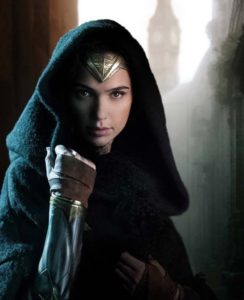
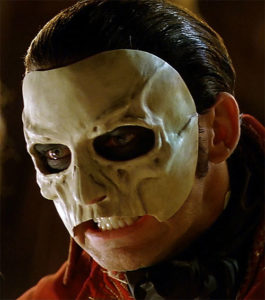
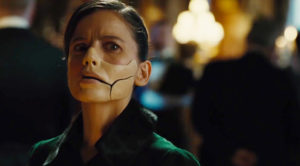
Wow. Just wow. A couple of my favorite parts:
“I believe in love. Only love can truly save the world.”
She seemingly now realizes that “mercy triumphs over judgement.” (James 2:13)
Every woman is a wonder.